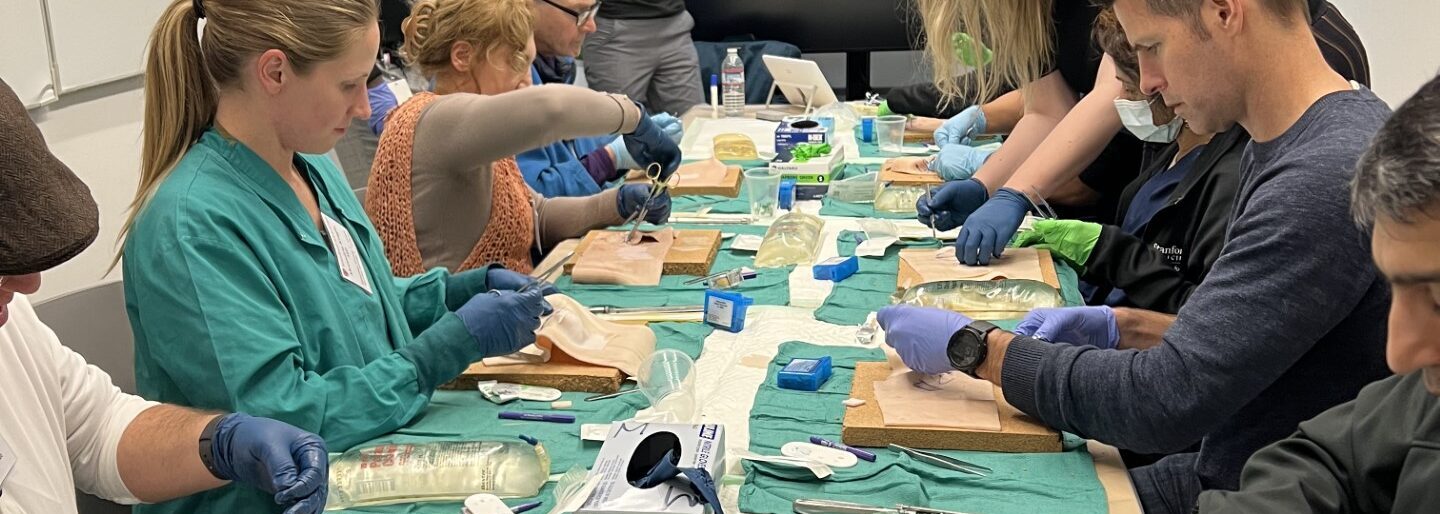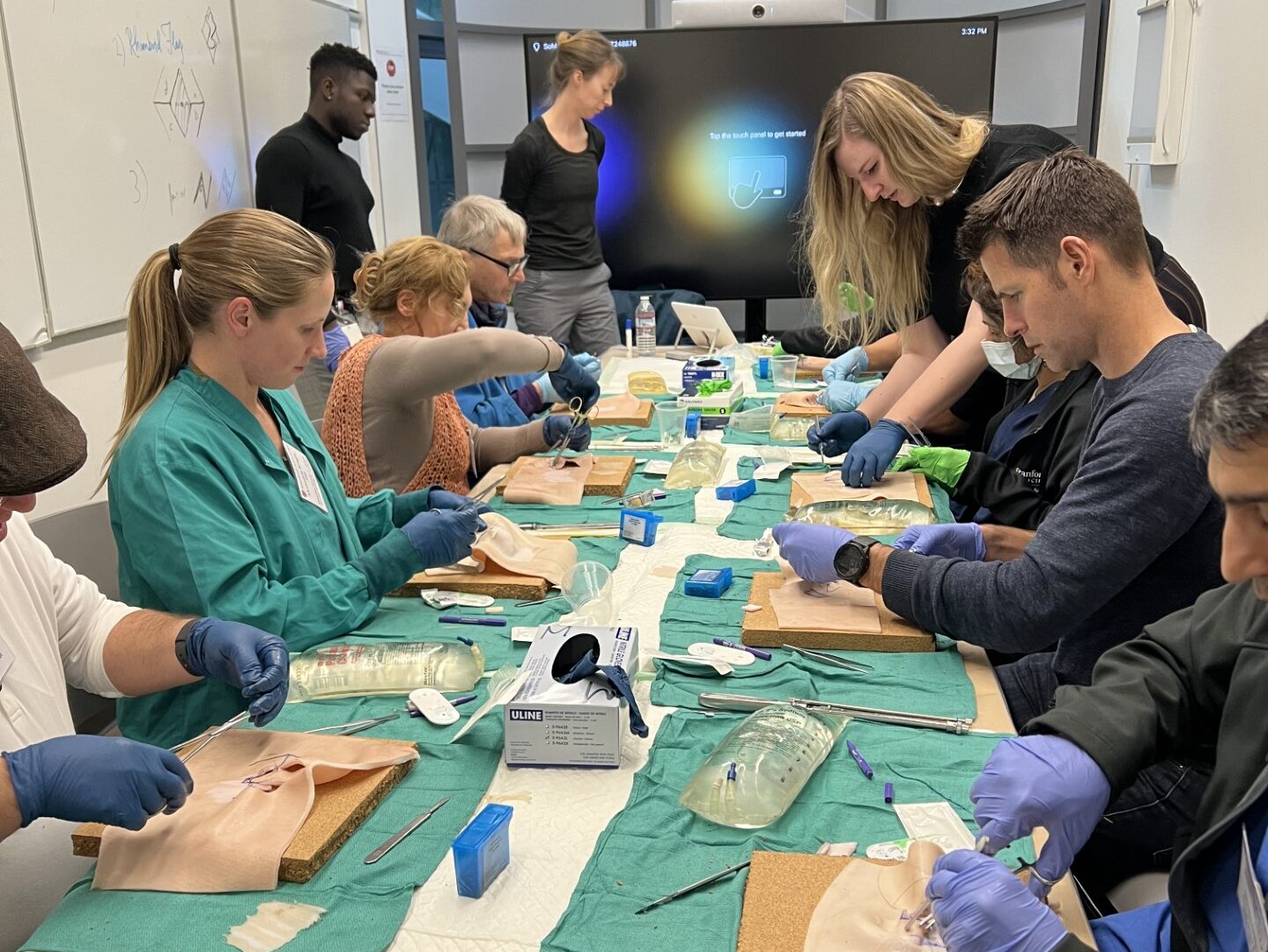Published: 09/13/2023
Date & Location
Saturday, January 20, 2024, 7:30 AM – Sunday, January 21, 2024, 12:00 PM
Li Ka Shing Center for Learning and Knowledge (LKSC), Stanford, CA
Overview
This CME activity will help prepare the International Humanitarian volunteer for delivering surgical care in a low resource setting for treatment of common surgical and obstetric conditions. In developing and in-crisis countries, the surgical volunteer must truly be a “generalist” and able to handle an array of surgical conditions. This 1 ½ day course will provide an overview of the scope of conditions that one might encounter in resource- limited environments. Through a variety of techniques including skill stations and simulation, participants will familiarize themselves with several relevant procedures, as well as the essential elements of surgical safety, ethics, and cultural considerations required for such settings. Specific skill areas that will be taught are orthopedic dislocations and fracture management with traction pins and external fixation, cesarean sections, post-partum hemorrhage, primary repair of inguinal hernia, wound and burn management, hand cutting of skin grafts and basic skin flaps, emergency burr holes, hysterectomy, uterine evacuations, tendon repairs, tropical medicine for surgical diseases, and low resource anesthetic techniques.
This course is intended for physicians and advanced practice providers with pre-existing surgical/procedural skills: surgery, emergency medicine, family medicine, and OBGYN.
Registration
Registration fee includes course materials, certificate of participation, breakfast and lunch.
Physicians – $980
Allied Health Professionals – $980
STAP-eligible employees can use STAP funds towards the registration fees for this activity. Complete the STAP Reimbursement Request Form and submit to your department administrator.
Credits
AMA PRA Category 1 Credits™ (12.00 hours), Non-Physician Participation Credit (12.00 hours)
Target Audience
Specialties – Emergency Medicine & Trauma, Family Medicine & Community Health, Infectious Disease & Global Health, Obstetrics & Gynecology, Surgery
Professions – Fellow/Resident, Non-Physician, Physician
Objectives
At the conclusion of this activity, learners should be able to:
- Evaluate the influence of resource factors on surgical decision-making in low resource environments and tailor care to the specific setting
- Demonstrate the procedural steps for management in low resource settings for: fracture management and dislocations
- Demonstrate the procedural steps for management in low resource settings for: cesarean section, post-partum hemorrhage, treatment of tubal pregnancy, dilation and curretage/MVA, fetal extraction for breech and transverse lie presentations
- Demonstrate the procedural steps for management in low resource settings for: wound/burn management, basic skin flaps, hand cut skin grafts, and hand injuries
- Implement management options in low resource settings for: tropical surgical diseases and anesthetic techniques
Accreditation
In support of improving patient care, Stanford Medicine is jointly accredited by the Accreditation Council for Continuing Medical Education (ACCME), the Accreditation Council for Pharmacy Education (ACPE), and the American Nurses Credentialing Center (ANCC), to provide continuing education for the healthcare team.
Credit Designation
American Medical Association (AMA)
Stanford Medicine designates this Live Activity for a maximum of 12.00 AMA PRA Category 1 CreditsTM. Physicians should claim only the credit commensurate with the extent of their participation in the activity.
Additional Information
Cancellation Policy
Cancellations received in writing no less than 20 days before the course will be refunded, less a 20% administrative fee. No refunds will be made on cancellations received after that date. Please send cancellation requests to stanfordcme@stanford.edu.
Stanford University School of Medicine reserves the right to cancel or postpone this program if necessary; in the event of cancellation, course fees will be fully refunded. We are not responsible for other costs incurred such as non-refundable airline tickets or hotel penalties.
Accessibility Statement
Stanford University School of Medicine is committed to ensuring that its programs, services, goods and facilities are accessible to individuals with disabilities as specified under Section 504 of the Rehabilitation Act of 1973 and the Americans with Disabilities Amendments Act of 2008. If you have needs that require special accommodations, including dietary concerns, please contact the CME Conference Coordinator.
Cultural and Linguistic Competency
The planners and speakers of this CME activity have been encouraged to address cultural issues relevant to their topic area for the purpose of complying with California Assembly Bill 1195. Moreover, the Stanford University School of Medicine Multicultural Health Portal contains many useful cultural and linguistic competency tools including culture guides, language access information and pertinent state and federal laws. You are encouraged to visit the Multicultural Health Portal: https://laneguides.stanford.edu/multicultural-health
For activity-related questions, please contact
Name: Sonia Vittori
Title: Education Events Specialist
Email: svittori@stanford.edu
For CME general questions, please contact
Email: stanfordcme@stanford.edu
Cover photo credit: Courtesy of Sherry Wren

